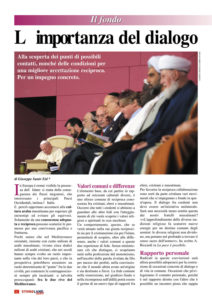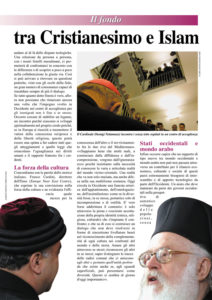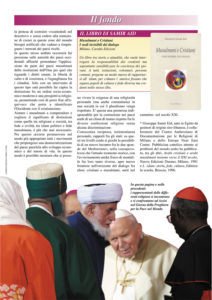Ethnoland News – pag. 40 – 7-20
Discovering the points of possible contact, as well as the conditions for better mutual acceptance: For a concrete commitment.
Giuseppe Eid
The presence of Islam is now visible in Europe: it is the consequence of the migratory flows, which affect the main Western countries, including Italy. It is, therefore, opportune to approach the Muslim Arab culture to overcome stereotypes and avoid misunderstandings. Only from an adequate and reciprocal knowledge can the premises for a peaceful and fruitful coexistence emerge.
Few people know that in the Eastern Mediterranean, together with one hundred million Muslim Arabs, live about twelve million Christian Arabs, who have always played an important role in the life of their countries over the centuries, and that in the future they could play a decisive role as a “bridge” between the two civilizations, in order to contain the increasingly pressing – and sometimes worrying – contrasts between the two shores of the Mediterranean.
Shared values and differences
The basic element, from which to build a relationship between different cultural horizons, is a common effort of mutual acquaintance between Christians, Jews and Muslims. All believers need to get used to looking at other faiths with the attitude wanting to discover the religious and spiritual values contained within them. If this attitude is implemented for both Christianity and Islam, it will make it possible to discover not only the differences but also the values common to these two experiences of faith. Without minimizing what distinguishes us, we discover ourselves united in the profession of monotheism, in listening to the word revealed by God through the prophets, in the conviction that the world has had an origin and is destined to end, the common faith in the resurrection, in the final judgment and in the reward in the afterlife, may be the seed of a new type of relationship between Jews, Christians and Muslims. In order to foster mutual collaboration, various movements have arisen on the Christian side which are deeply committed to this work. The dialogue between believers must not be a unilateral initiative. It will be a necessity that will be less felt by our Muslim brothers and sisters. “The deepening of the different religious divisions gives rise to new energies for a common destiny of men: the different religions do not divide no, but lead deep down to find the sacred meaning of man”, wrote A. Riccardi in Peace is Possible.



Interpersonal Relationship
Rooted in these convictions it will then be possible to work for the construction of concrete opportunities for dialogue and life in common. It is though the direct relationship with the other that we can go beyond theological disputes. A person-to-person relationship with our Muslim brothers and sisters will allow us to confront our differences in concrete terms and to discover little by little the right way. In this way we can come to terms with practical issues and strengthen the dialogue ever more. If all that has been said so far is true, we can only stress once again that the commitment made in the West in the reception centres for immigrants is not an end in itself. It is necessary to try to establish a bond, so that each one may develop spiritually in his or her own creed; if in Europe we succeed in transmitting the value of mutual knowledge and religious freedom, this may be a push to bring down all those positions and laws that hinder equality in human rights and the fraternal relationship between believers.
The strength of culture
We agree with the words of the Italian historian. Franco Cardini, director of Enee (Europe Near East Centre), who expresses his conviction in the strength of culture and highlights its effectiveness as a means for the knowledge of the other and the rapprochement between the two shores of the Mediterranean. “We know very well that many evils, starting from distrust and incomprehension, come from ignorance: this is why we insist on the need to understand the varied and articulated reality of the near Middle Eastern world. It is a reality that must not only be studied, but also defended in its multiform substance. Today, in the West, there is a fatal rhetoric of flattening, homologation, assimilation, as if diversity were only the cause of incomprehension and hostility. Perhaps even the opposite is true: it is only through the full and conscious acceptance of one’s own identity (ethnic, religious, cultural) that confrontation is implanted: and that a dialogue is built on it that must not be resolved in forms of fusion, instead in the recognition of the complementarity of each culture towards the world and history: to love others through oneself, to recognize others in oneself, to know how to distinguish the traces of the common roots that unite us to others and therefore that profound unity that exists even if, at superficial glances, it can present itself as diversity. This seems important to us today”.
Western states and the Arab world
Finally, it must be understood that a new type of relationship between the Western world and the Arab world cannot but pass through a contribution to the economic, cultural and social revival of these countries that are extremely in need of exchange and technological contribution from the West. Western governments must provide aid with a view to the authentic development of their populations, without the pretence of building “cathedrals in the desert” and without giving in to the temptation to create artificial needs in these parts of the world that will fill the markets of rich countries. In the same context, pressure must be brought to bear on the authorities of Western countries to demand that Muslim countries implement UN resolutions on human rights, freedom of religion and conscience and equality between citizens. Only with an intervention of this kind will it be possible to make it clear the distinction between a modern socio-economic order and a religious perspective, thus allowing the misunderstanding that leads to the identification of the West with Christianity. Helping Muslims to understand and grasp the meaning of distinctions between religion and society, between faith and civilization, between political Islam and Muslim faith, is more necessary than ever. For this reason it is necessary to promote in the most appropriate way all the movements that propose a democratization of the country that is parallel to economic development and standard of living. In this way it is possible to show that the demands of a personal (but also community) religiosity can be lived out in a society where pluralism is respected. This is an indispensable premise for the construction in Arab countries of a climate of mutual respect between the different religious denominations without any discrimination. I believe that on these three levels (reciprocal knowledge, personal witness and relations between states) the possibility of a new meeting between the two shores of the Mediterranean is at stake, in the awareness that the current historical moment, with the physical approach of so different mentalities, opens new frontiers in the horizon of dialogue between Jews, Christians and Muslims, united in the path of the 21st century.
Giuseppe Samir Eid
Free web translation from the original in Italian
The published articles intend to provide the tools for a social inclusion of the migratory flow, shed light on human rights and the condition of life of Christians in the Islamic world from which the author come from. Knowledge of the other, of cultural and religious differences are primary ingredients to create peace in the hearts of men everywhere, a prerequisite for a peaceful coexistence and convinced citizenship in the territory.